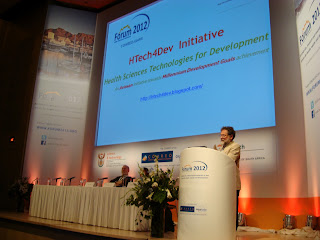With the support
from COHRED Group (Geneva), Aviesan held a session on Health Technology
Transfer, as part of the Global Forum 2012. It was of course an opportunity to
present HTech4Dev program and progress, but the main purpose of the session was
to focus on the necessary (contextual
and pragmatic) elements for the transfer
of health technologies toward Low and Middle Income Countries (LMICs). Topics related to health technologies (infrastructure,
developmental challenges, market and regulatory acceptance) were presented and
discussed. In addition, boarder topics
of intellectual property, jurisdictional approaches, social acceptance and
impact were presented and discussed. Thanks to all of our speakers who
travelled from far away (Bangladesh, Canada, Europe and Thailand) to share with
the audience their experience in the use
of new technologies to fill the gap between developed and under-developed
economies.
During the first part of the session, the orators nicely pictured the great promises of some nano-based technologies as solutions to basic human health problems. Some presenters described regional examples/challenges for the successful implementation and use of tele-medicine. An informative and enlightening lecture given by the President of the European Group on Ethics who provided some clues on how Africa may better valorize by building an environment prone to protect Africa generated intellectual property. A presentation by WHO (World Health Organization) Assistant Director-General for ‘Innovation, Information, Evidence and Research’ detailed success, and evidenced that local production of therapeutics in Africa can be viable. Participants from several key organizations were present and contributed to the stimulating discussions. Representatives from IFPMA (the International Federation of Pharmaceutical Manufacturers & Association) and WIPO (World Intellectual Property Organization) illustrated the specificity and challenges to be addressed on health technologies transfer in LMICs. An outstanding presentation was made by the President of the Cameroon Bioethics Initiative who explained on the African social move needed toward the acceptance of these new technologies.
Judging from the level of participant’s engagement and discussions (going well beyond the scheduled time, follow-up actions and networking), the session on Health Technology Transfer was a success.
All these presentations will be made available soon on Forum 2012 website (www.forum2012.org).
During the first part of the session, the orators nicely pictured the great promises of some nano-based technologies as solutions to basic human health problems. Some presenters described regional examples/challenges for the successful implementation and use of tele-medicine. An informative and enlightening lecture given by the President of the European Group on Ethics who provided some clues on how Africa may better valorize by building an environment prone to protect Africa generated intellectual property. A presentation by WHO (World Health Organization) Assistant Director-General for ‘Innovation, Information, Evidence and Research’ detailed success, and evidenced that local production of therapeutics in Africa can be viable. Participants from several key organizations were present and contributed to the stimulating discussions. Representatives from IFPMA (the International Federation of Pharmaceutical Manufacturers & Association) and WIPO (World Intellectual Property Organization) illustrated the specificity and challenges to be addressed on health technologies transfer in LMICs. An outstanding presentation was made by the President of the Cameroon Bioethics Initiative who explained on the African social move needed toward the acceptance of these new technologies.
 |
| Prof Carel IJsselmuiden, Director COHRED |
Judging from the level of participant’s engagement and discussions (going well beyond the scheduled time, follow-up actions and networking), the session on Health Technology Transfer was a success.
All these presentations will be made available soon on Forum 2012 website (www.forum2012.org).
 |
| Dr Jacques Grassi, Director ITS, Aviesan |
 |
| Dr Marie-Paule Kieny, WHO Assistant Director-General |
 |
| Dr François Hirsch, Aviesan ITS |
 |
| Prof. Julian Kinderlerer, Cape Town University |



It is good to see the importance put on the transfer of health technologies toward Low and Middle Income Countries.
ReplyDeleteThis is a such a nice blog post. During the first part of the session, the orators nicely pictured the great promises of some nano-based technologies as solutions to basic human health problems. Good work keep it up !!!
ReplyDeletePCR Primers
I have to say you have good knowledge.
ReplyDeleteYes you have good knowledge with full details.
Deletenice pics
ReplyDeleteI just read through the entire article of yours and it was quite good. This is a great article thanks for sharing this informative information
ReplyDeletetreat hemorrhoids
Thanks for sharing. It is really nice. I like it. Thanks and keep awaiting for more post.
ReplyDeleteAdvanced Male Medical Center
Can I just say such a relief to seek out somebody that truly knows what theyre referring to on the net. You definitely have learned to bring an issue to light and work out it critical. More and more people must look at this and understand this side from the story. I cant believe youre no more popular since you certainly provide the gift. Natural treatments for PCOS
ReplyDelete